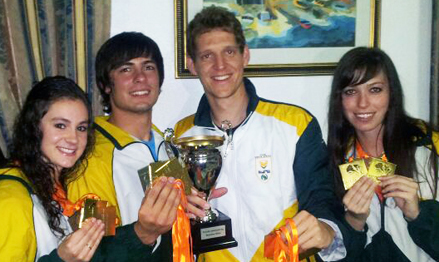Latest News Archive
Please select Category, Year, and then Month to display items
12 October 2020
|
Story Arina Engelbrecht
|
Photo Supplied
 Arina Engelbrecht from Organisational Development and Employee Well-being believes physical activity has a number of benefits for one’s health, including stress relief.
Arina Engelbrecht from Organisational Development and Employee Well-being believes physical activity has a number of benefits for one’s health, including stress relief.
Being physically active plays a big role in preventing the development of mental-health problems and in improving the quality of life of people experiencing mental-health problems.
Treatment for depression
Physical activity can be an alternative treatment for depression. It can be used as a stand-alone treatment or in combination with medication and/or psychological therapy. It promotes all kinds of changes in the brain, including neural growth, reduced inflammation, and new activity patterns are formed that promote feelings of calm and well-being. It releases endorphins – powerful chemicals in the brain that energise your spirit and make you feel good.
Physical activity can be very effective in relieving stress. Research in adults has found that physically active individuals tend to have lower stress levels compared to individuals who are less active. It also leads to improved sleep. When a person sleeps better and feels more rested, overall quality of life improves. They cope better with daily life stressors.
Reduce Alzheimer's risk
Regular physical activity can reduce your risk of developing Alzheimer's disease by up to 50%. It can also slow down further deterioration in those who have already started to develop cognitive problems. It stimulates the brain’s ability to maintain old connections as well as to make new ones.
A study asked people to rate their mood immediately after periods of physical activity (e.g. going for a walk/run, cycling, doing housework) and periods of inactivity (e.g. reading a book or watching television). Researchers found that participants felt more content, more awake, and calmer after being physically active compared to after periods of inactivity.
In conclusion, people who are physically active feel a sense of well-being, feel more energetic throughout the day, sleep better at night, have sharper memories, and feel more relaxed and positive about themselves and their lives.
“Being physically active not only changes your body, it changes your mind,
attitude, and your mood.” – Arina Engelbrecht
Kovsies help SA Badminton win gold at 2013 AFCON
2013-08-27
|
 |
Elmé de Villiers, Andries Malan, Wiaan Viljoen and Sandra le Grange.
Photo: Supplied
27 August 2013 |
A former Kovsie and the current captain of the South African Badminton team, Olympian Wiaan Viljoen, won two gold medals at the 2013 Africa Cup of Nations (AFCON) Individual events that concluded in Mauritius on 20 August 2013.
South Africa proved their dominance in the 2013 Continental Championships by winning three gold, two silver and three bronze medals in the Individual events. Combined with the gold medal for the team, South Africa won four out of the six gold medals up for contention, with the other two going to Mauritius in the ladies’ singles and to Seychelles in the ladies’ doubles respectively.
Kovsies’ Elmé de Villiers and Sandra le Grange also carried the ladies’ side of the South African team through every match of the AFCON and De Villiers won the deciding match in the final against Nigeria. De Villiers has been included in the 2016 Road to RIO BWF Project of Excellence. Both De Villiers and Le Grange are players to watch closely en route to the 2016 Olympic Games.
De Villiers and Le Grange also won the doubles title at the Mauritius International, which was held in the week after the AFCON. This was the first international title for both De Villiers and Le Grange.